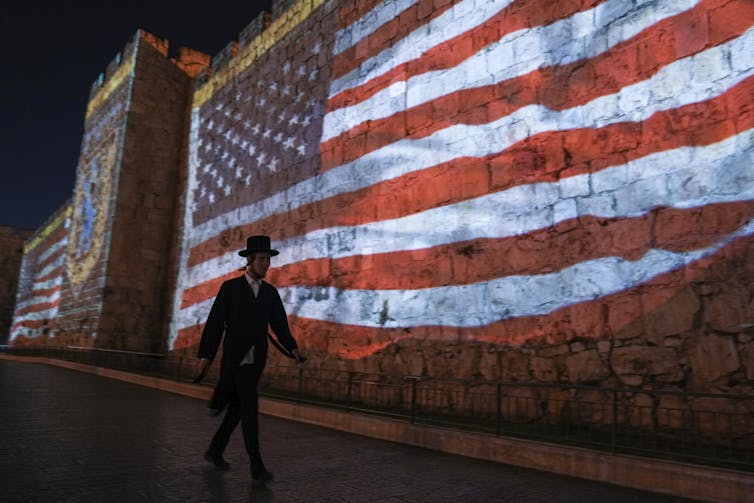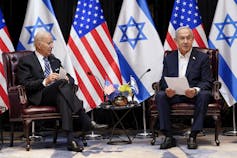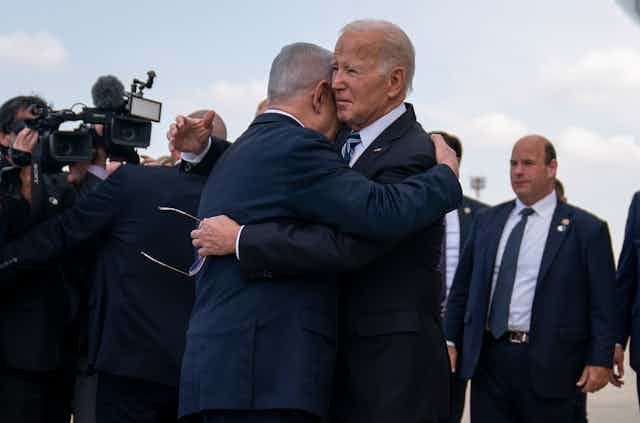U.S. President Joe Biden is in Israel to lend support to the country in the midst of an already bloody war between the Israelis and Hamas, including the bombing of a Gaza City hospital that has left hundreds dead.
Following Biden’s meeting with Israeli Prime Minister Benjamin Netanyahu in Tel Aviv, it’s worth looking back at American foreign policy and profound U.S. mismanagement of ongoing crises in the Middle East over a period of decades. It illustrates how badly American domination has served international peace and stability.
Some have argued that Hamas’s attack on Israel is an indication of the chaos and disorder that will follow in an emerging “multipolar world,” meaning one in which the U.S. is no longer firmly in control of international affairs.
But let’s look at how that U.S. control has worked out for the Middle East in the past. The current war in Gaza is a direct product of the failure of American foreign policy. It’s an argument in favour of a multipolar world, one in which the U.S. has less influence and other powers can act as countervailing forces.
Destabilizing influence
The U.S. has a long history of destabilizing the Middle East, a critically important region of the world. In 1953, the U.S. and the U.K. engineered a coup against democratically elected Iranian Prime Minister Mohammed Mossadegh and strengthened the shah of Iran.
The shah’s hated regime fell to the Iranian revolution in 1979. The result was the Islamic Republic of Iran, a state that has bedevilled the U.S. and its allies ever since.
In 2003, the U.S. illegally invaded Iraq, killing more than 300,000 people, and spreading chaos across the region. The so-called War on Terror has raged on, killing millions more, directly and indirectly, for years.
The American mishandling of the Israeli-Palestinian conflict is another substantial failure. Given its enormous leverage over both parties, the U.S. could have taken more neutral steps to bring about a just end to the conflict long ago. Instead, it catered to increasingly radical Israeli governments, facilitating the brutal subjugation of the Palestinians and creating the pressure cooker that has now exploded.

Pressure cooker erupts
The United Nations has called Israel’s occupation of Palestinian territory “unlawful under international law.” For many decades, Israel has built settlements in the West Bank that amount to the de facto annexation of Palestine. Israel has also annexed East Jerusalem. Today, the Israeli settler population in occupied Palestine stands at 700,000.
The settlements violate Article 49 of the Fourth Geneva Convention. They are the single greatest obstacle to the “two-state solution” to the Israeli-Palestinian conflict.
The U.S. formally opposes Israeli settlements, but has done nothing to actually stop them. Instead, it’s provided Israel with weapons and financial support and protected Israel from facing the consequences of its violations of international law in the United Nations and other international institutions.
This protection has apparently instilled in Israel an attitude of impunity. Israel builds settlements and oppresses Palestinians; the U.S. either helps it do so or defends Israeli actions.
In 2021, the international NGO Human Rights Watch issued a report that said Palestinian “deprivations are so severe that they amount to the crimes against humanity of apartheid and persecution.” Other groups like Amnesty International say Palestinians are subject to regular violence and humiliation from the Israel Defense Forces (IDF) and Jewish settlers.
The current Israeli government encourages and protects settler violence and has expressed an intent to annex what remains of Palestine. Indeed, its push for controversial judicial reform is connected to its designs on Palestinian land.

‘Open-air prison’
Gaza has been described as an open-air prison. For 17 years, it’s been under an illegal blockade that violates Article 33 of the Fourth Geneva Convention that bans what’s known as collective punishment.
Youth unemployment is 60 per cent; 97 per cent of the water is undrinkable; child malnutrition is rife.
Had the U.S. used its global leverage to push Israel to adhere to international law, the situation might have been avoided. Instead, it enabled Israel’s expansionist ambitions while undermining international law.
The former Donald Trump administration abandoned any American pretense of even-handedness in the Israel-Palestine conflict, implementing the Abraham Accords, which were designed to sidestep the Palestinian issue altogether by creating economic ties between Israel and neighbouring Arab states.
Biden’s administration has doubled down on Trump’s efforts by pushing the normalization of relations between Saudi Arabia and Israel, again sidestepping the Palestinians.

Region on edge
There is no excusing Hamas’s incredibly violent actions on Oct. 7. But the attack has been linked to Israeli efforts to build ties with Arab nations like Saudi Arabia.
As Biden spends time in Israel, it’s a stark reminder that the U.S. is no longer qualified to mediate the conflict.

As the war claims thousands of Palestinian civilians, the region is in danger of exploding. Arabs are enraged; Hezbollah may intervene. The cost of oil may spike, further damaging the fragile world economy.
China helped re-establish diplomatic relations between Iran and Saudi Arabia because it gets more than 50 per cent of its oil from the Middle East and has a powerful interest in regional peace.
Even so, it apparently has no desire to insert itself into a quagmire the U.S. helped create.. Other powers that rely on Middle Eastern oil have to endure the consequences of unbalanced and inept American policy.
The United States causes and exacerbates many of the problems and conflicts that it later seeks to manage. American strength has meant the rest of the world has had to accept this reality. But the sooner a true multi-polar world emerges, the better it will likely be for global stability — and maybe even for the rule of law.


